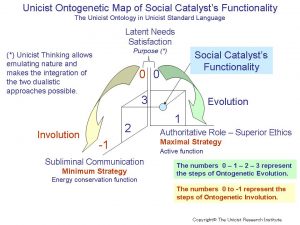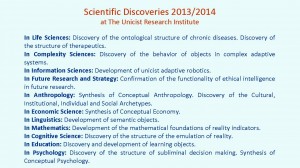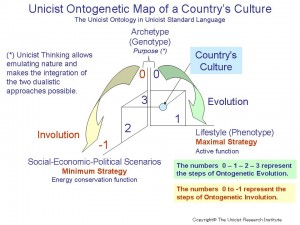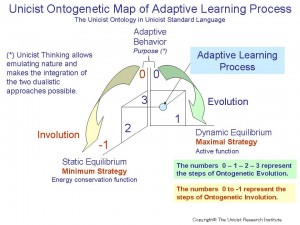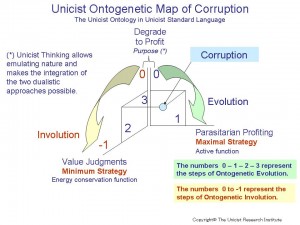The Unicist Ontology of Complex Systems
The Unicist Ontology of Complex Systems was researched and developed by Peter Belohlavek at The Unicist Research Institute based on the experiences and applications in medicine, human behavior, social behavior, businesses and future research. The apprehension of complex systems requires a significant abstraction and integration effort in order to be able to emulate these systems in mind.
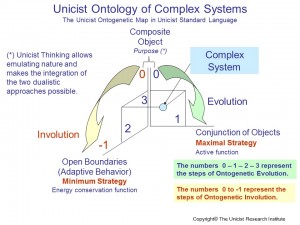 This unicist ontology provides an answer that ends the open discussion of what complex systems are. It allowed defining the functionality of complex systems and how to influence such systems and build them.
This unicist ontology provides an answer that ends the open discussion of what complex systems are. It allowed defining the functionality of complex systems and how to influence such systems and build them.
A Complex system is an entity that works as a composite unicist object, integrated by a conjunction of objects, that has open boundaries with the environment.
All complex systems are organized by objects, which allow managing complexity. This is self-evident in a human body where each organ is an interdependent object to sustain the life of the human being. Another example in social life can help to clarify this characteristic of the complex systems: the roles people assume work as objects in society.
At an operational level, the core characteristics of a complex system are:
- All the elements of the complex system are integrated by conjunctions without the possibility of the existence of disjunctions.
- The openness of the boundaries of the objects that integrate the complex system and the openness of the system as an object itself.
A unicist object is defined as an adaptive system that has a concept to fulfill, has a value adding function and a quality assurance process to sustain the purpose of the system. The concept is defined by having a purpose, an active function to put the purpose in action and an energy conservation function to sustain the achievement of the purpose.
The complexity of a system is intrinsic, which means that it does not depend on the perception of an individual. But in order to apprehend a complex system it is necessary that the person emulates the system in mind, which fully depends on the individual.
This requires that the individual needs to be able to go beyond a dualistic thinking process in order to be able to apprehend the conjunctions implicit in the system and needs to have the concept of the environment in order to be able to deal with the open boundaries of the system.
There are fields that are generally accepted as being complex such as: Life-sciences, social sciences, anthropology, political sciences, economic sciences, behavioral sciences, medicine, psychology, education, businesses, ecology, meteorology.
The Ontological Algorithm of a Complex System
The driver of a complex system is the concept that regulates its unified field to generate results. This driver is what generates the emergence (results) of the complex system.
 The system needs to add value in order to influence the environment to sustain the openness of its boundaries. The fulfillment of the purpose of the concept is sustained by a quality assurance process that needs to manage the influence of the environment.
The system needs to add value in order to influence the environment to sustain the openness of its boundaries. The fulfillment of the purpose of the concept is sustained by a quality assurance process that needs to manage the influence of the environment.
The maximal strategy is based on managing the conjunction of the objects that integrate the complex system. It requires identifying the objects that integrate the system and how they are integrated.
The integration of the objects is given by their conjunction including them following the rules of the double dialectical logic. This logic defines that each object is integrated with another object assuming a complementary or supplementary role and their integration builds an object of superior order of complexity.
Since these interdependent objects that have biunivocal relationships are integrated, it is necessary to apprehend them as a unified field using the unicist logic, which emulates the ontogenetic intelligence of nature.
The functionality of the biunivocal influence works as the catalyst of the functionality of the complex system.
The minimum strategy that sustains the functionality of the complex system is built upon the management of the open boundaries based on the adaptive behavior of its elements. Such adaptive behavior implies that adaptiveness is sustained by the influence that is exerted by the system while the influence that is exerted by the environment on the system is managed.
The influence exerted on the environment is based on the complementation of the complex system with the environment. This complementation requires covering two different aspects:
- An asymmetric complementation with negative slope in order to have an influential role.
- A symmetric complementation to establish a participative relationship with the environment.
The influence exerted by the environment is based on a competitive relationship, which implies the existence of supplementary roles between the system and the environment. This requires paying the prices of sustaining the objective of the system within the boundaries established by the influence of the environment.
Adaptiveness is the final goal of the minimum strategy and requires managing the biunivocal influence between the system and the environment.
Levels of Complexity Management
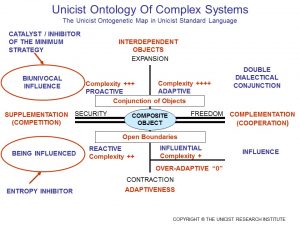 The complexity of a system is defined intrinsically by the characteristics of the system. The more objects that integrate a complex system, the higher the level of complexity of such system.
The complexity of a system is defined intrinsically by the characteristics of the system. The more objects that integrate a complex system, the higher the level of complexity of such system.
Five levels of complex systems have been defined:
- Level of Complexity 0 – Over-adaptive Complex System
- Level of Complexity 1 – Influential Complex System
- Level of Complexity 2 – Reactive Complex System
- Level of Complexity 3 – Proactive Complex System
- Level of Complexity 4 – Adaptive Complex System
Level of Complexity 0 – Over-adaptive Complex Systems
These are entities that have adjacent roles to the environment which makes them work as “hygienic” entities.
They have no internal complexity because they follow the environment which implies that they establish an asymmetric complementation with positive slope. Over-adaptive systems are not complex.
Level of Complexity 1 – Influential Complex Systems
These are the complex systems that participate in isolated niches of the environment having the capacity of influencing the environment by providing elements that are perceived as necessary by the environment.
They are integrated by few interdependent objects and the open boundaries deal with a restricted isolated environment. Their level of complexity is given by the need to build complementary roles.
Level of Complexity 2 – Reactive Complex Systems
This level includes the complexity implicit in the previous level. These are complex systems that are organized to manage the influence of the environment without over-adapting.
These system are extremely efficient in their peripheral structure, which allows them to respond to the influence of the environment without losing their purpose and functionality. Their level of complexity if given by the need to manage the influence exerted by the environment.
Level of Complexity 3 – Proactive Complex Systems
This level includes the complexity implicit in the previous level. These are complex systems that exert an active influence on the environment in order to expand.
They are expansive entities that have developed a superior capacity to manage processes in a competitive environment that is basically defined by the biunivocal relationships they need to manage. Their level of complexity is given by the need to manage biunivocal relationships with the environment.
Level of Complexity 4 – Adaptive Complex Systems
This level includes the complexity implicit in the previous level. These are complex systems that adapt to the environment that are driven by their capacity of building bridges between apparently incompatible needs.
They manage the capacity to build complementation at a superior level when the lower level fails. They are innovative entities that manage the conflicts with the environment by generating additional added value. Their level of complexity is given by the need to manage the future of the environment, the possibilities of the system and its complementation in changing environments.
Conclusion
All complex systems are organized by objects, which allow managing complexity. This is self-evident in a human body where each organ is an interdependent object to sustain the life of the human being.
Another example in social life can help to clarify this characteristic of the complex systems: the roles people assume work as objects in society.
This has several consequences:
- A complex system is, by definition, constituted by interdependent objects.
- When researching a complex system what needs to be researched are the objects of the system.
- When a human built complex system has no established objects, it is transformed into an over-adaptive system.
- To apprehend complex systems individuals need to be able to emulate their architecture in mind, which requires being able to deal with open boundaries and conjunctions while leaving aside the disjunctions implicit in value judgments.
Unicist Executive Committee
NOTE: The Unicist Research Institute was the pioneer in using the unicist logical approach in complexity science research and became a private global decentralized leading research organization in the field of human adaptive systems. It has an academic arm and a business arm. https://www.unicist-school.org/theoryofevolution/wp-content/uploads/2015/07/turi.pdf


